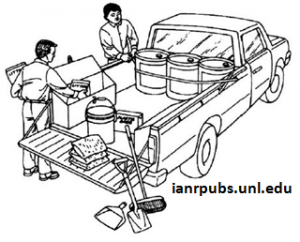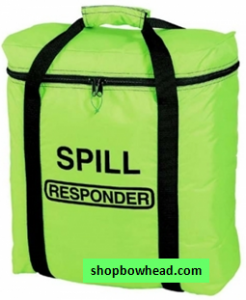The safest way to transport pesticides is in the back of a truck or pickup truck that is in good operating condition to help reduce the chance of an accident. Use common sense; any vehicle should have working brakes, lights and turn signals, horn, and windshield wipers. This is especially important when transporting pesticides.
 Never carry pesticides in the passenger compartment of a vehicle. A flatbed truck used for carrying pesticides should have side and tail racks to tie down and keep the load contained. If the truck has a wooden bed, insert a plastic or truck bed liner that is impervious to chemical spills before loading pesticides. You can easily decontaminate them in case of an accidental spill or leak.
Never carry pesticides in the passenger compartment of a vehicle. A flatbed truck used for carrying pesticides should have side and tail racks to tie down and keep the load contained. If the truck has a wooden bed, insert a plastic or truck bed liner that is impervious to chemical spills before loading pesticides. You can easily decontaminate them in case of an accidental spill or leak.
Use a van or station wagon as a last resort. Place pesticide containers in a plastic container that is used only for that purpose. You may need a number of these containers, with lids. Never transport pesticides with food, animal feed, minerals, or consumer goods. Ventilate the cargo and passenger compartments by opening windows. Avoid carrying passengers, but if you must, keep passengers away from the containers during transport.
Become familiar with the labels of the pesticide products you will be transporting. Pack the appropriate personal protective equipment (PPE) as listed on the label so you are prepared in case of a spill or leak. You can find copies of the labels online by searching for the product name and company. Otherwise, contact the pesticide dealer.
 Keep a hazardous materials spill kit in your vehicle at all times. If you don’t have room to carry the spill kit on a daily basis, make sure to load it in your vehicle when you know you will be transporting pesticides. A spill kit commonly contains chemical-resistant gloves, coveralls, goggles, absorbent pads, absorbent material such as kitty litter, a small shovel, heavy weight plastic garbage bags, and a plastic container for temporary storage. Carry protective clothing and equipment in the passenger compartment of the vehicle when transporting pesticides.
Keep a hazardous materials spill kit in your vehicle at all times. If you don’t have room to carry the spill kit on a daily basis, make sure to load it in your vehicle when you know you will be transporting pesticides. A spill kit commonly contains chemical-resistant gloves, coveralls, goggles, absorbent pads, absorbent material such as kitty litter, a small shovel, heavy weight plastic garbage bags, and a plastic container for temporary storage. Carry protective clothing and equipment in the passenger compartment of the vehicle when transporting pesticides.
Then, drive safely. Take the safest route. In case of an accident, typically both the vehicle owner and operator are responsible for and must deal with the consequences.
If you must stop along the way, remember to lock your vehicle securely. Never leave pesticides unattended. You are legally responsible if people are accidentally poisoned from pesticides left unattended in your vehicle.
Compiled by Jan Hygnstrom, Erin Bauer and Clyde Ogg, University of Nebraska – Lincoln
